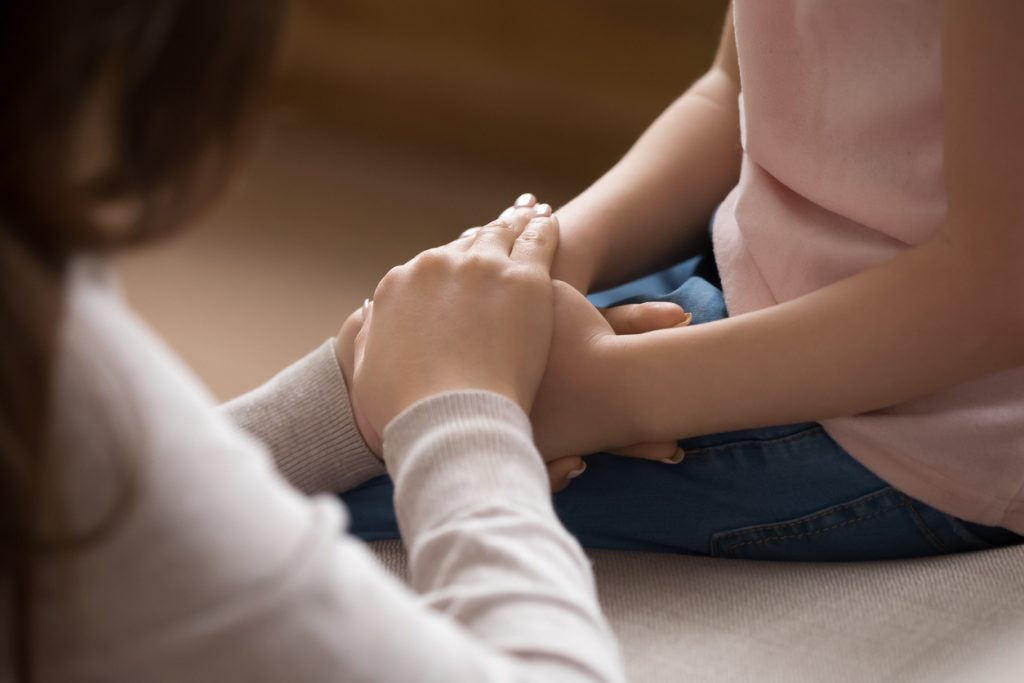Why I Won’t Tell My Kids to Think Positive

“You have to think positive”
The first time I remember those words stirring up feelings of anger and frustration was when I sat in a doctor’s office at Sick Kids Hospital waiting for the results of my son’s spinal X-rays. A friend was sending me messages trying to ease my mind.
I know the words were meant to make me feel better but they didn’t. Instead they frustrated me. I was resentful and angry, thinking ‘my positive thoughts aren’t going to straighten his spine.’
Feeling the ugly feelings is not something that we, as a society, are comfortable with.
We are bombarded with messages; memes, articles, books, videos, all telling us that we need to think positive. We should focus on the bright side, shed ourselves of negativity.
We are told that thinking positive will improve our health, make us happier, help us to live longer. Yet we are not told what to do with all of the negative emotions.
I get it—we can’t allow ourselves to get lost in a pit filled with bitterness and pity. Positive affirmations help us through tough times. But I think the push on the positive trend can be dangerous. It can lead us to believe we are failing when in fact we are just feeling sad.
Life is filled with negative feelings. Bad things happen. Our children have to learn how to manage the feelings that come along with those things, not pretend they don’t exist.
So I give my kids permission to feel them.
We learn from an early age that the negative emotions make people uncomfortable and the cheerful emotions make people happy. I’m trying to teach my kids it’s not only ok to feel the negative emotions, it’s completely normal.
I often ask my kids, “Are you mad?” and at first they weren’t comfortable saying yes. For some reason they thought their anger would disappoint us. After an argument one evening, my son stormed off to his room crying. I gave him a few minutes to cool off and knocked on his door.
He wouldn’t look me in the eye.
I asked “Are you mad?” and he didn’t reply. It opened the door for a conversation about anger and what we do when we’re hurt or frustrated or fuming mad. I told him that it’s ok to cry when we feel sad or frustrated. I explained that sometimes I cry when I’m angry.
By the end of the conversation he told me that I made him mad because I wouldn’t hear him out. I apologized and heard him out. Now when I ask if he’s mad, he owns his anger. He’s not ashamed of it.
When my son was in the NICU, I spent almost the entire six weeks in tears. People had a hard time looking me in the eye during that time. The world was not comfortable with my pain. So I tried to hide it. I locked myself in bathrooms, I cried in the shower, I tried with all my power to keep it away from others.
It was my first parenting lesson. I want my kids to be comfortable with their pain. I don’t ever want them to feel as though they have to hide it or pretend it’s not there for the sake of someone else.
You won’t hear me tell my kids to think positive. Instead, I’m trying to help them learn to work through their emotions. To own them, feel them, communicate them, and then let them go and move on.
Recently, we had a rough week in our house. There was stress, tears, frustrations. I overheard my daughter tell someone that “Mummy was having a stressful day and it was making her feel frustrated.” She said it as though it was the most normal thing in the world. Not a hint of embarrassment or shame, just an acknowledgment of a real human emotion.
It was a proud parenting moment.
I want nothing more than for my children to live happy, fulfilled lives. But in order for them to be happy, they have to do more than think positive. They have to be comfortable in their sadness. If I can teach them that, it will be enough for me.












